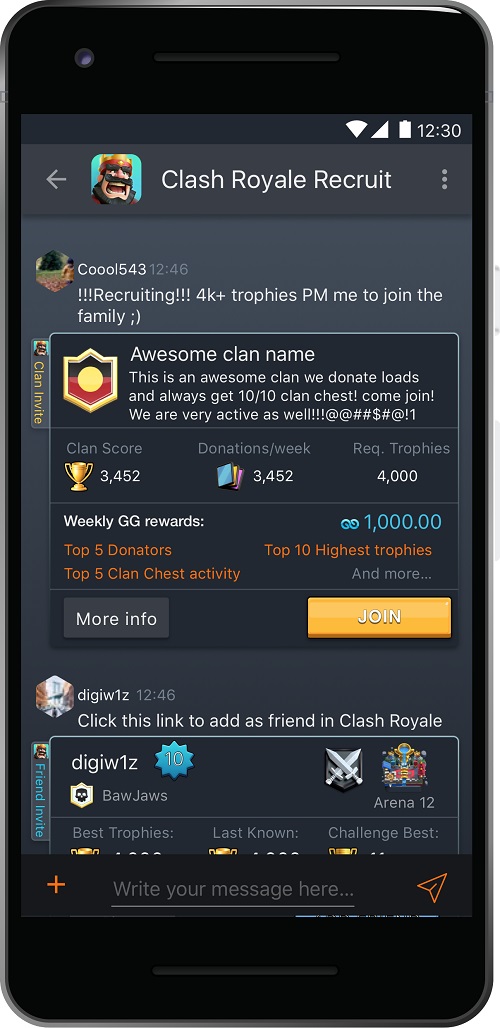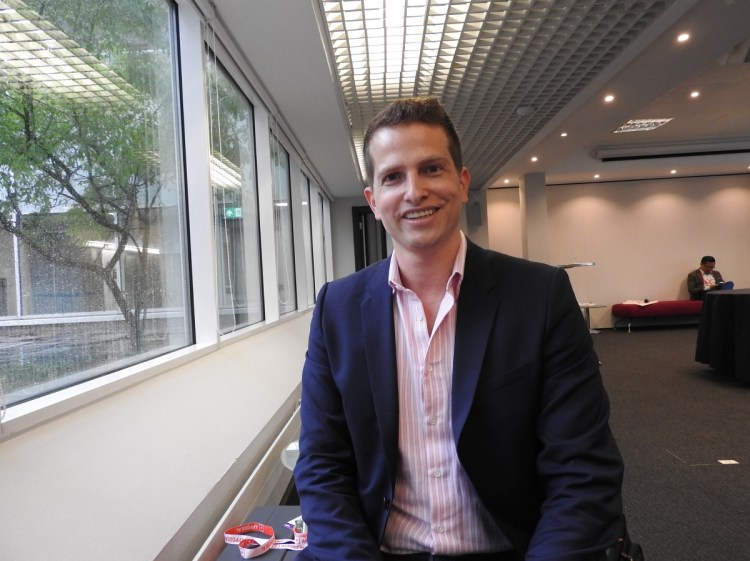ClanPlay has created a mobile app that serves as a social hub for gamers who play in clans in games such as Clash Royale. Now it has created what it calls the world’s first marketplace for in-game actions.
The Tel Aviv, Israel-based startup is using blockchain and cryptocurrency technology to create a reward system where gamers can essentially be paid for completing actions in a mobile game, said Leonard Frankel, CEO of ClanPlay, in an interview at the Casual Connect Europe event in London.
It’s another step toward the what I call the Leisure Economy, where we all get paid to play games. In this case, game developers don’t have to spend their money on expensive ads on Google or Facebook. Rather, the developers can directly pay users to take actions inside games.
“Exactly,” Frankel said. “This is about getting paid to play games. We’ll create better efficiency in the market. And we’ll do good things for gamers.”
Frankel said that a lot of great gamers have skills, but they don’t have bank accounts. So ClanPlay can issue tokens to gamers as a reward. The other big problem is that advertisers are enriching platforms such as Facebook, and gamers aren’t receiving any of that money.
“They deserve to get paid,” Frankel said. “We will pay for skills in games. We have decided to solve these problems by creating a marketplace for in-game actions.”
This marketplace will be based on a new cryptographic utility token called Good Game (“GG”) which will be sold privately in the coming quarter.
ClanPlay unveiled its vision to change the way gamers are viewed from acquisition targets to skilled individuals that should be rewarded and encouraged to play new games, Frankel said.
Earlier this year ClanPlay became the highest rated app for gamers with a star rating of 4.8 out of 5.0 on both Google Play and iOS. The status was achieved after adding support for two of the most successful mobile games: Clash of Clans and Clash Royale and attracting an audience of more than 1.5 million users.
“When we look at the games market, we find two major problems that require immediate attention: Games are being promoted on a centralized handful of platforms, where advertising budgets are paid to huge corporations instead of directly to the end-users, the players,” Frankel said. “And while there are numerous parties interested in paying for in-game services, there are no structured means to do so.”

Above: ClanPlay is adding tokens that can be used to incentivize gamers.
ClanPlay envisions its marketplace as an efficient system in which game developers can pay users (with ‘GG’ tokens) in proportion to how engaged they are with their games. For players a campaign could be structured to incentivize progression milestones such as watching the game’s ad, downloading it, reaching level five and even making the first purchase.
All milestones will be disclosed beforehand and payment for them would be guaranteed as part of a trust-less solution, coded into the smart contract (i.e. automatically managed by the blockchain). In addition, ClanPlay will let developers harness the power of social promotion by paying influencers (e.g. YouTubers and streamers) a share of revenues generated by players that clicked links they share.
Direct revenues sharing would align interests of both parties and create a fair-trade practice that the company expects to be attractive for tens of thousands of game influencers, whose content is currently under-monetized, Frankel said.
To address the second problem described, ClanPlay will enable peer-to-peer trading where interested parties can pay players for in-game actions and services. Authorization providers that access game data, like ClanPlay’s own technology, will verify action completion and automatically approve payments.
For the first time, the GG Marketplace will allow gaming team leaders and esports managers to easily incentivize their players to complete in-game tasks such as joining a team or reaching in-game goals.
“Last year only 17,000 players participated in esports events and earned money from their gaming skills,” Frankel said. “They brought in an average monthly income of $550. That’s not enough gamers, and it’s not enough money. Our upcoming GG Marketplace will create a new meritocratic economy in which gamer skills are financially valuable.”
He added, “We want to take those players earning money from games and turn them into 10 million or 20 million.”
In the future, the GG token could be used to attract strong players to join clan recruitment posts, and then to encourage activity. The marketplace will offer three types of interactions: Direct Discovery Campaigns in which developers plot a rewarded journey for players to engage with their games; Peer-to-peer interactions between players and Cross-Game Tournaments where any action inside games can become a winning criterion and “game triathlons” can be formed with automatic distribution of prizes, across multiple games and even multiple platforms. Such tournaments would make for a lucrative advertising media as they could attract audiences and form unique entertainment opportunities.
ClanPlay has developed the infrastructure for this marketplace and now turns to private supporters to fund further development by selling a portion of the tokens being issued. A total of one billion GG tokens are being issued, of which 300 million will be sold in a private sale during Q2 and Q3 2018. The project’s advisers include entrepreneurs Andrey Nayman and Henric Suuronen.
Frankel and Asaf Semo started ClanPlay in 2016. The company has raised equity funding from founders of game companies such as Plarium, Huuuge, Diwip, and Babil Games. ClanPlay is among only two games-related companies in the history of Israel to have received a government grant for technological innovation.
Disclosure: Casual Connect paid my way to London. Our coverage remains objective.

